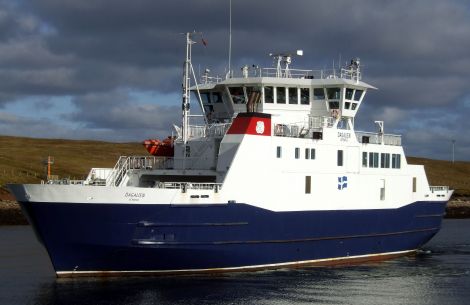News / Mismanagement caused SIC cash crisis
SHETLAND Islands Council would not have to close schools or cut ferry services if it had managed its reserves sustainably over the past 13 years, a new report has confirmed.
SIC finance director James Gray says that if budgets had been handled properly, the council would have an extra £8 million to spend each year into the future, instead of having to cut spending by £30 million over five years.
Gray’s detailed study of how Scotland’s wealthiest local authority has come close to bankruptcy reveals how poor financial management led to spending going up 10 times faster than income.
The council’s oil funds fuelled levels of expenditure that created a massive structural deficit, forcing it to withdraw £100,000 a day from its reserves just to keep services going.
Without the current austerity drive to cut spending by 20 per cent with the loss of 600 jobs, the council would be in the red by 2017, Gray says.
His report was commissioned by the SIC’s audit and standards committee, which wanted to know how the council had got into such desperate financial straits.
Gray says that back in 2000 the council’s reserves, built up from hosting the oil industry at Sullom Voe, were worth £425 million at today’s prices.
Since then they have fallen by 58 per cent to just £193 million. The current savings drive is aimed to hold them at £125 million.
Gray says that since 2003 the SIC has spent £300 million more than it has received in government grants, council tax, charges, fees and bank interest.
The main cost has been staffing increases in just two departments – education and especially social work.
Over the past 10 years the number of full time equivalent employees in community care has tripled from 326 to 968.
Become a member of Shetland News
During that time the council has spent £200 million from its reserves on the day to day running of the council, reaching a high point of £35.8 million last year – almost £100,000 a day.
A further £125 million has been spent on capital projects – including £37 million on two new Yell Sound ferries – in the process increasing the council’s annual bill for repairs and maintenance.
Meanwhile income from running the oil port at Sullom Voe has steadily fallen, with no profit expected over the next three years.
Gray says the overspending was “masked” by the way in which budgets were reported.
Furthermore the council had no clear financial strategy for dealing with the global financial crisis that struck in 2008.
While other authorities were reining in expenditure, the SIC kept spending more money. Its income went up by just three per cent from 2009, however expenditure rose by 30 per cent funded purely from reserves, the draw on which tripled from £10.4 million to £31.8 million.
Gray says that fluctuations in the amount of interest the council received on its investments led to “skewed financial planning”.
“When there has been a large return in the past, this has led to a view in certain quarters that it justifies a large level of spending from the reserves. However, the council has suffered years of large losses too,” he explains.
“There is no evidence to suggest that appropriate consideration has been given to what could be sustainably taken from the reserves each year in order to maintain the real value (i.e. inflation proof) of the reserves.
“As a result the council’s previous policy of retaining a reserves floor of £250m was breached and the level of reliance on the reserves meant that they were on course to be fully depleted by 2017.”
He says that in future no more than three per cent of the reserves should be spent in any one year, amounting to £5.8 million at current levels.
“Had the council adhered to a policy of a sustainable draw on reserves since they peaked in 2000, it would mean that the council would have over £8m per year more to spend each year on services in perpetuity.
“This could have meant that no savings would now be required from schools or ferries.”
Gray has delivered an eight point action plan to ensure no repetition of the crisis.
As well as calling for better financial planning, reporting and management he suggest the council should “maximise” its income from fees and charges for council services.
He adds that in future, more consideration should be given to the cost implications of capital projects.
The full report to Thursday’s audit and standards committee can be read here.
Become a member of Shetland News
Shetland News is asking its many readers to consider paying for membership to get additional features and services: -
- Remove non-local ads;
- Bookmark posts to read later;
- Exclusive curated weekly newsletter;
- Hide membership messages;
- Comments open for discussion.
If you appreciate what we do and feel strongly about impartial local journalism, then please become a member of Shetland News by either making a single payment, or setting up a monthly, quarterly or yearly subscription.
































































